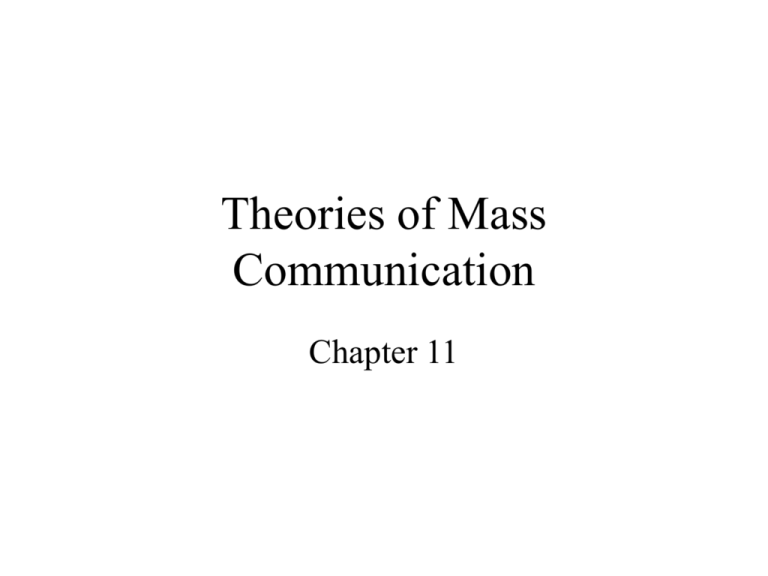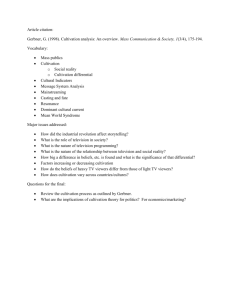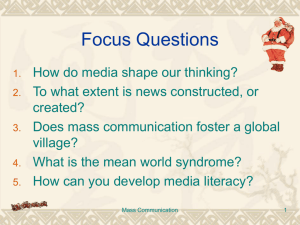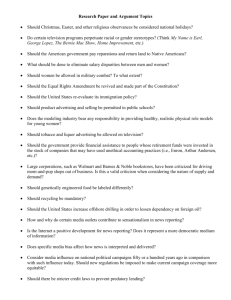Theories of Mass Communication
advertisement

Theories of Mass Communication Chapter 11 Marshall McLuhan • The Mechanical Bride (1951) • The Gutenberg Galaxy: The Making of Typographic Man (1960) • Understanding Media: The Extensions of Man (1964) • The Medium is the Massage: An Inventory of Effects (1967) Technological Determinism • “The theory Marshall McLuhan advanced has been called technological determinism. As with any deterministic theory, the basic claim is that some single cause or phenomenon determines other aspects of life” (237). Technological Determinism • “The theory of technological determinism states that technology – specifically, media – decisively shapes how individuals think, feel, and act and how societies organize themselves and operate” (238). Media History • • • • The Tribal Epoch The Literate Epoch The Print Epoch The Electronic Epoch Media History • Some characteristics of the tribal epoch: – Speech developed by homo-sapiens 20,00040,000 years ago. – Orality, Aurality, and tactility – Narrative Storytelling – Immersion and Simultaneity – Cohesive Communities Media History • Some characteristics of the literate epoch: – The invention of the alphabet in Greece, 1000 B.C. – Vision – Linearity – Logic – Solitary Learning Media History • Some characteristics of the print epoch: – The invention of the printing press in Germany, 1450 AD. – Everything that was mentioned for the literate epoch, but on a larger scale. – Fragmented communities. – The emergence of the middle-class. Media History • Some characteristics of the electronic epoch: – Revival of Oralality/Aurality and Tactility. – The “global village.” The Medium is the… • The medium is the message. – The medium determines the content of communication. • The medium is the massage. – The medium has the power to manipulate our perceptions of the world. • The medium is the mass-age. – Mass communication has become the dominant form of interaction. The Medium is the Message • Some examples of how messages are crafted to conform to the medium. – – – – Film and TV action/violence. Windows interface and “multitasking.” The hypertext book. TOOL audio recording: “Die Eier Von Satan” Media: Hot and Cool • Hot Media “are those that include relatively complete sensory data. Thus, a person doesn’t need to fill in a lot of information to understand the message” (242). • Cool Media, on the other hand, demand involvement from individuals” (242). Cultivation Theory • “Cultivation theory claims that television cultivates, or promotes, a view of social reality that is inaccurate but that viewers nonetheless assume reflects real life” (244). Cultivation Theory • “Cultivation is the cumulative process by which television fosters beliefs about social reality. According to this theory, television portrays the world as more violent and dangerous than it really is” (245). – Cumulative impact as opposed to a “magic bullet.” Violence • The National Commission on the Causes and Prevention of Violence (1967 and 1968). • The Surgeon General’s Scientific Advisory Committee on Television and Social Behavior (1972). Violence • Content Analyses of television demonstrate high incidence of violence. – Cultivation theory infers from the high rate of televised violence that viewers will come to expect and tolerate violence in their real lives. In other words, they will come to see the world as a violent place. Cultivation of… • Attitudes toward sex roles. • Development of racial/ethnic stereotypes. • Expectations concerning physical appearance and sexuality. – “If we believe that all relationship problems can be fixed, that sex can always be sublime, and that couples live happily ever after, then we’re likely to be dissatisfied with real relationships that can’t consistently live up to these synthesized images” (248). 2 Mechanisms of Cultivation • Mainstreaming: “television’s ability to stabilize and homogenize views within a society” (248). • Resonance: “the extent to which something is congruent with personal experience” (249). Assumptions of Cultivation Theory • Television is unique because it is pervasive. • The pervasiveness of television gives it the power to establish the cultural mainstream. • Television cultivates broad assumptions as opposed to specific attitudes. • Television is a medium of conservative socialization (it reinforces cultural norms and practices). Assumptions of Cultivation Theory • The observable effects of television on culture are relatively small. • New technologies extend television’s influence. Criticisms of Cultivation • Causation Vs. Correlation – Television viewing causes fear. – Fear causes television viewing. – A third factor causes both television viewing and fear.








